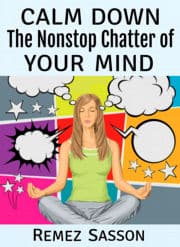
Anxiety disorders are among the most common mental disorders, along with depression, that people have nowadays. Anxiety has effects not only on your thoughts but on your body too. When the anxiety has a high level, you might find yourself sweating, trembling, your heart beating faster and breathing rapidly.
A lot of negative thoughts might rush through your head, such as: Will they like me less if I tell them my opinion? Why do I have no energy for this? They will think I am bad at my job because I stutter and so on.
Anxiety comes with a high level of stress and your impossibility of silencing your thoughts. The problems come from our heads so we need to find ways to cope with them. One way to cope with high levels of stress is meditation.
What Is Meditation?
Browse our online courses on meditation, positive thinking, overcoming procrastination, confidence, and freedom from distractions.
Meditation is an old Buddhist technique that is used to cope with the stress of anxiety because of its relaxation effect. Even though it seems too good to be true, meditation is a nice way to work with on changing negative thoughts, observing reality and accepting it.
There are many types of meditation, mindfulness being the most popular of all. It promotes kindness and positive emotions, helping you make peace with your negative ones.
Meditation, if practiced daily, can help you cope and get rid of anxiety. But what healthy behaviors and thought patterns does it promote?
1. You Learn More About Yourself
Besides sitting comfortably in a chair or on a couch and paying attention to your body movements and breath, you also need to focus on your thoughts.
While meditating, you create the perfect context for you to get to know yourself and your thoughts better.
Mindfulness promotes the technique of observing your thoughts and letting them go. Like this, you have an insight into the way you think and make connections.
It is said that our mind is made up of a lot of drunken monkeys chattering. It is the loudest monkey that makes questions such as “What if”, specific to anxiety, arise. By observing its pattern, you learn more about yourself, about how your mind reacts in different situations and what triggers those unhealthy thoughts.
2. You Learn to Be More Present
One of the characteristics of anxiety is that people that have it live mostly in the past or the future, too less in the present.
We have anxiety when we think about the past and we start analyzing everything we did right or wrong. We have anxiety when we think about the future because we mostly think we do not have the resources to face whatever the future may bring.
Anxiety prevents us from living in the present moment and this means we lose the beauty of life.
Meditation is a way to help you stay more present and see the beauty in your life. Yes, it is true. Life is not only made of positive and good things but of challenges and failures too. Daily meditation helps you accept this and enjoy the present moment more.
You cannot do something to change the past, so you should think about it only to learn something from your past experiences.
You can change the future, but thinking constantly about how you can do it, actually prevents you from focusing on what you need to do. So, the best thing you can do is to be more present and enjoy life. And this is what meditation is about.
3. You Learn to Relax
If you have anxiety, you already know that it is difficult to relax when so many thoughts rush through your head. Meditation and mindfulness involve breathing techniques that help your mind learn to relax.
They also include relaxation techniques such as observing how your chest is moving when you breathe.
Meditation urges you to focus on your body sensation and your breathing, not on your thoughts. Your mind will take a break from focusing on negative thoughts and making predictions for the future and it will relax more.
If you practice meditation daily, your mind will learn to make the association between breathing and focusing on your body, not on your thoughts. The more you practice it, the more you will relax. And this keeps away anxious thoughts for some moments.
4. You Learn to Be Less Judgmental
We have at least 70.000 thoughts rushing through our minds every day. Indeed, we are not aware of all of them, but the loudest monkey in our head makes sure we focus on the negative ones. We start to judge our behaviors and ways of acting, becoming less and less tolerable to ourselves.
This makes us trust ourselves less and think that no matter what we say or do, nothing is as it should be.
Meditation and especially mindfulness help us notice our thoughts and let them go without judging them, nor ourselves. Meditation practiced daily fosters self-compassion, which is so important when you have anxiety. It helps you learn more about yourself and your environment and accept you as who you are.
5. You Strengthen Your Attention
When there are so many thoughts rushing through your head, you pay attention to lots of them. Your attention is rushing through your thoughts just like you do, being incapable of focusing on one of them.
If you experience high levels of anxiety, you already know that it impairs your ability to focus on your tasks and not only. Your anxiety is making your attention focus on things that could go wrong, leading to a decrease in productivity.
Meditation, if practiced daily and consistently, can help you improve your power to concentrate.
Online Meditation Course: The Path to Awakening
Meditation techniques with guidance for finding inner peace, expanding consciousness, and awakening.
During meditation, the part in your brain responsible for sensory information shuts down. This means that your mind is less open to distractions and you can focus on your breathing and body sensations.
Like this, you improve your focus and concentration. You will be able to focus easily on your task and keep anxious thoughts away.
Conclusion
Coping with anxiety is not an easy thing to do and if you ever feel that you completely lost control, you should ask for help from a therapist. However, some people experience light symptoms of anxiety and they can learn to cope with them by themselves.
Meditation is a great way to help you focus on the present moment and live less in the past or future. It is an old Buddhist technique that helps you relax, silence your inner critic and improve the muscles of your attention.
To really benefit from meditation, you need to practice it daily and consistently.
Even though the results are not immediate, staying motivated to meditate daily will make them appear. After some practice, you will notice an improved concentration. Also, you will be less judgmental and you will accept yourself as who you are. Because life is beautiful and anxiety prevents you from living it at its fullest.
About the Author
Tobias Foster is a journalist and editor who offers assignment help UK and dissertation help. He loves psychology, sociology, and anthropology and he shares advice with his followers. Tobias is a master of his craft and he improved his skills by meditating 10 minutes every day.

